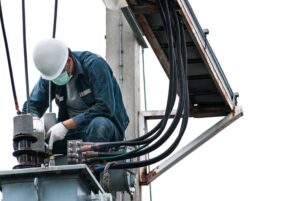Last Updated on October 22, 2024 by SEO Rankings
Dangers are part of daily life when a loved one works in maritime industries. Many jobs on docks, ships, and harbors expose workers to hazardous conditions. If a tragic accident occurs and a family member loses their life, you’re not left without options for financial relief.
The Longshore and Harbor Workers’ Compensation Act (LHWCA) provides death benefits to families who lose a loved one while they’re employed in these maritime roles. Knowing what you can expect from these benefits – and how a skilled maritime accident lawyer can access them – can make a huge difference when it feels like everything has turned upside down.
What Is the Longshore and Harbor Workers’ Compensation Act?

The Longshore and Harbor Workers’ Compensation Act is a federal law that offers financial protection for maritime workers injured on the job, or in this case, when the unthinkable happens and someone dies. The law provides benefits to the surviving family, ensuring that they’re not left in financial turmoil after the sudden loss of their primary income source.
While the LHWCA extends to a wide range of maritime workers, it specifically covers those who work on navigable waters, docks, terminals, and harbors, as well as shipbuilders, longshore workers, and harbor construction workers.
The compensation available includes benefits for injuries, disabilities, and fatalities. As the family of a deceased worker, you’re entitled to specific death benefits that provide monetary assistance during a difficult time. While no money can replace your loved one, these benefits can cover financial obligations and funeral costs and provide ongoing support for dependents left behind.
How Death Benefits Work Under the LHWCA
When a worker dies due to a work-related accident or injury, surviving family members can receive benefits under the LHWCA. The law is designed to protect the worker’s dependents, offering financial assistance based on the deceased worker’s earnings. These death benefits are vital to helping families maintain stability.
Death benefits are calculated as a percentage of the deceased worker’s income. Surviving spouses and dependent children are the primary beneficiaries. If no spouse or children exist, other relatives financially dependent on the worker may also qualify.
You can also expect to receive help with funeral expenses. The law allows for coverage of funeral and burial costs up to a set limit, alleviating the financial burden of laying your loved one to rest. Even with emotional challenges, you can focus on healing instead of scrambling to cover immediate expenses.
Who Qualifies for Death Benefits Under the LHWCA?
It’s important to know who qualifies for death benefits after a fatal maritime accident. The LHWCA prioritizes immediate family members, ensuring that surviving spouses and children receive the financial support they need. In the absence of these dependents, other family members who depended on the worker may also be entitled to benefits.
- Surviving spouse: The surviving spouse is the primary beneficiary and receives a substantial portion of the death benefits. The payments are generally calculated as a percentage of the deceased worker’s weekly earnings. These benefits are provided for the spouse’s lifetime, but remarriage may affect their continued eligibility.
- Dependent children: Children who were financially dependent on the deceased worker are also entitled to a portion of the benefits. Typically, the amount is based on the worker’s income and divided among the eligible children. If the children are minors, these benefits continue until they reach adulthood. In some cases, dependent children over the age of 18 may still qualify for benefits if they’re enrolled in full-time education or are unable to support themselves due to a disability.
- Other dependents: If no spouse or children exist, other relatives who were financially dependent on the deceased worker, such as parents or siblings, may qualify for benefits. The law ensures those who relied on the worker’s income aren’t left without help after the tragic loss.
What Happens When There Are Multiple Dependents?
If you’re wondering what happens when multiple dependents qualify for death benefits, rest assured that the LHWCA has provisions in place to address this. The benefits are typically divided among all eligible dependents based on a set percentage of the worker’s average income.
For example, suppose a spouse and one or more children survive. In that case, the spouse will generally receive a portion of the benefits, and the remaining benefits will be distributed among the children. The goal is to ensure that all dependents receive adequate support. However, specific amounts can vary depending on the worker’s income and the number of dependents involved.
Calculating Death Benefits: Understanding the Numbers
The LHWCA calculates death benefits based on the worker’s average weekly income (AWW) at the time of death. For surviving spouses, benefits typically amount to 50 percent of the worker’s AWW. If there are dependent children, an additional 16.67 percent is added for each child, divided among them.
Here’s a closer look:
- If a worker earned an average of $1,200 per week, the surviving spouse can receive $600 weekly, which is 50 percent of the AWW.
- If there is one dependent child, the child can receive $200 per week (16.67 percent of the AWW), bringing the total family benefit to $800 per week.
- If there are two dependent children, each child will receive an equal share of the 16.67 percent designated for children, with the spouse continuing to receive 50 percent.
Other dependents may still be eligible for compensation in cases with no surviving children or spouse. The specific calculation will depend on their level of financial dependence on the worker, but they may also receive a portion of the worker’s AWW.
The Funeral and Burial Allowance
Dealing with the costs of a funeral and burial can add a layer of stress to an already overwhelming situation. Fortunately, the LHWCA provides coverage for these expenses, ensuring that your loved one can be honored without forcing you into financial hardship. The funeral and burial allowance is a fixed sum the employer or insurance company must pay to help cover costs.
This allowance is capped at a specific limit, which adjusts periodically but is usually sufficient to handle basic funeral expenses. Knowing that this cost is covered can ease the burden during an emotionally difficult time.
Dealing With the Employer’s Insurance Carrier
Under the LHWCA, employers must carry workers’ compensation insurance that benefits workers and their families in case of an injury or death. After a fatal accident, the employer’s insurance company is responsible for processing and paying out death benefits to the worker’s dependents.
However, insurance companies may not pay benefits promptly, or they may contest a claim. In some instances, insurance carriers may delay payments or question the circumstances surrounding the death. You need to be proactive in seeking assistance. If you’re dealing with an uncooperative insurance company, an experienced maritime accident attorney will protect your rights and work to ensure the delivery of benefits.
Can You Appeal a Denied Death Benefits Claim?
If a claim for death benefits is denied, don’t assume the denial is final. You have the right to appeal. The appeals process under the LHWCA involves several steps, beginning with a hearing before an administrative law judge (ALJ). During the hearing, both parties present evidence, and the judge decides based on the facts of the case.
If you disagree with the ALJ’s decision, you can appeal to the Benefits Review Board (BRB) to review the case and determine whether the ALJ’s ruling should stand. In some cases, further appeals can be made to the U.S. Court of Appeals.
The appeals process may seem intimidating, but pursuing it can be vital to securing the benefits you’re entitled to. Remember that certain deadlines apply to appeals, so taking swift action is important if your claim is denied.
Preparing for Administrative Hearings
If your case goes to a hearing, it’s natural to feel overwhelmed by the prospect of presenting your side in front of a judge. However, you’re not alone in this process. A maritime accident lawyer can gather the necessary documents, witness statements, and expert testimony that may support your claim.
Administrative hearings under the LHWCA are less formal than court trials, but the stakes are just as high. The judge’s decision can determine whether you receive death benefits or not. As such, it’s important to ensure that your case is well-organized, with all the relevant facts presented clearly.
When preparing for a hearing, you’ll need to provide:
- Medical records or autopsy reports that link the death to the worker’s employment.
- Testimony from coworkers, supervisors, or others who can confirm the accident’s details or the worker’s health leading up to their death.
- Any documentation showing financial dependence on the deceased worker, especially for surviving spouses, children, or other relatives.
Being thorough in your preparation can make the difference between a successful claim and a prolonged battle.
The Importance of Filing the Claim Correctly
Filing your claim properly is key to avoiding delays or denials. The LHWCA has specific requirements for how and when you should file a death benefits claim. Missing a step or submitting incomplete paperwork can result in a rejection of the claim, forcing you to restart the process or appeal the denial.
You must file your claim with the Department of Labor (DOL), which oversees LHWCA claims. The form used for filing a death benefits claim is Form LS-262, which requires detailed information about the worker’s death, your relationship to the deceased, and their income.
Once the claim is filed, the DOL reviews the information and may contact you for additional details. The review process can take time, and any missing documentation can slow it down further. To ensure everything goes smoothly, double-check the forms for accuracy before submission and keep copies of all documents for your records.
Time Limits for Filing a Claim
The LHWCA imposes strict deadlines for filing death benefit claims. The surviving family must file a claim within one year of the worker’s death. Failing to meet this deadline can jeopardize your right to receive benefits, so acting promptly is necessary.
It’s also important to note that claims for medical benefits related to the worker’s injury or death may be subject to separate time limits. For example, medical providers may need to file claims within a set time frame after providing care to the worker.
Awareness of these time limits is essential to preserving your family’s right to compensation under the LHWCA. Don’t hesitate to file a claim as soon as possible to avoid unnecessary complications.
Why You Need a Maritime Accident Lawyer
Maritime law is unique and requires a specific understanding of how the LHWCA applies to your situation.
A maritime accident attorney can help you through every step of the claim process, from filing the initial paperwork to representing you in hearings or appeals if necessary. If you’re encountering resistance from an insurance company or employer, having legal support ensures you don’t face this alone. You’ll have someone on your side, advocating for your family’s financial security.
When you’re dealing with the trauma of losing someone close, the legal system can feel overwhelming. Having someone to rely on can take the pressure off of you, allowing you to focus on what matters most – taking care of your family and honoring your loved one.
What If Your Loved One’s Death Was Due to Employer Negligence?
Sometimes, a worker’s death may be due to the employer’s negligence or failure to follow safety regulations. If you believe this contributed to your loved one’s death, you may have additional legal options beyond death benefits. While the LHWCA typically bars you from suing the employer directly, there are circumstances where a third-party lawsuit may be possible.
If a third party, such as a contractor, equipment manufacturer, or another entity, contributed to the death, you may have grounds to file a wrongful death lawsuit. This can provide additional compensation for your family beyond what’s offered through the LHWCA.
Taking the Next Steps
A maritime accident lawyer can stand by your side to ensure your family receives the full benefits you’re entitled to and help you explore any other legal options that may be available to you. Taking the next steps with legal representation can give you the best chance of securing the future for your family. Please don’t hesitate to contact an experienced maritime accident attorney at The Young Firm for a consultation.




